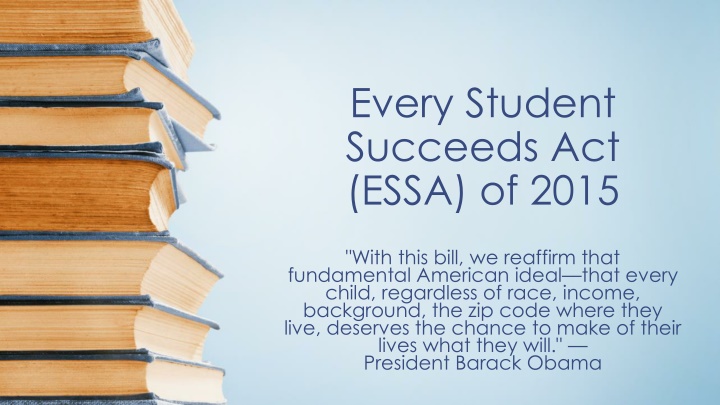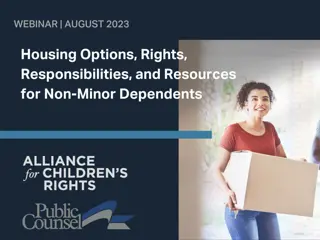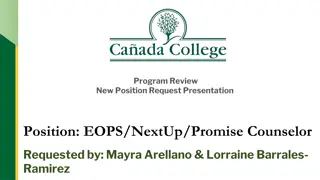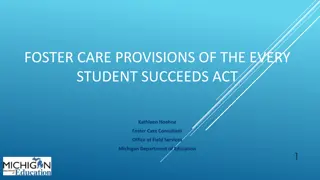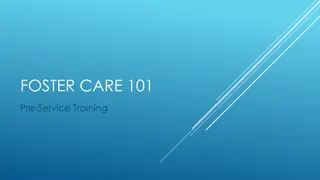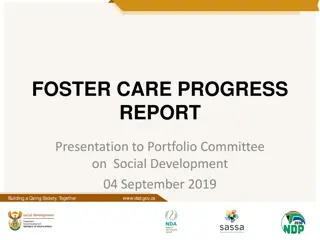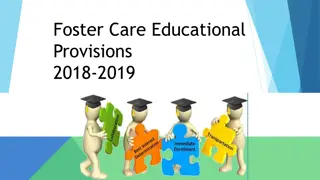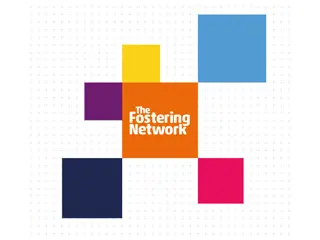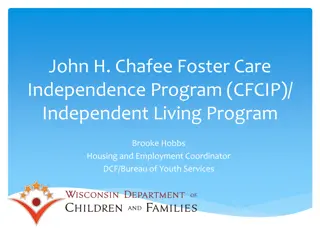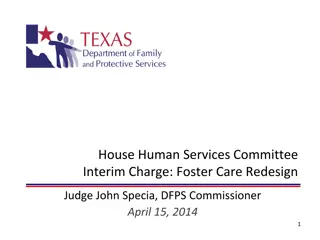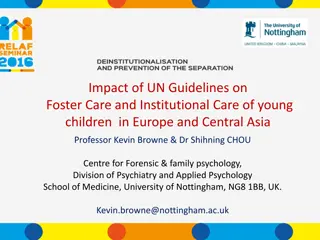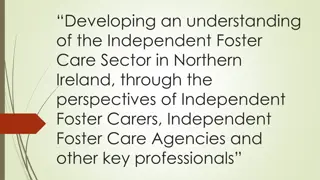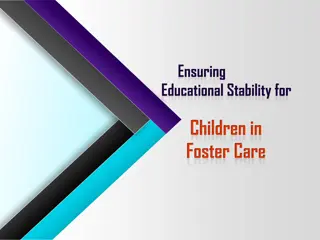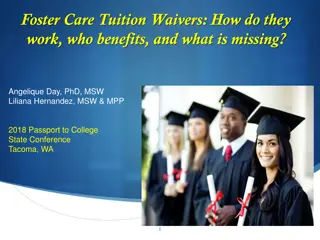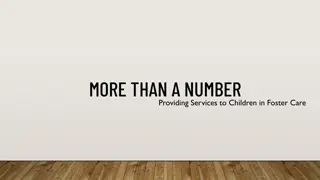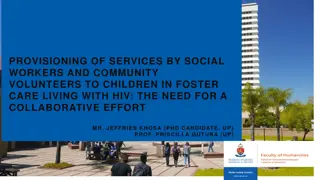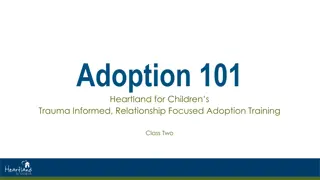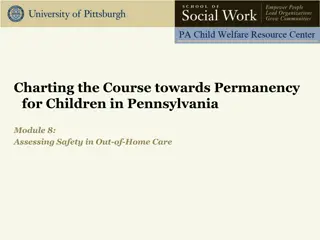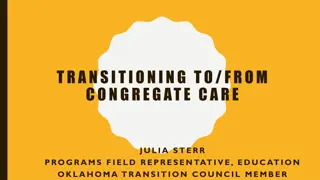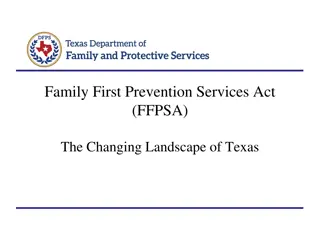Addressing Educational Challenges Faced by Children in Foster Care
The Every Student Succeeds Act (ESSA) of 2015 emphasizes the right of every child to succeed academically, regardless of background. In Philadelphia, thousands of children are placed in foster care, facing educational barriers such as instability, lack of support, and high school graduation challenges. National statistics reveal the struggles foster youth face, including high school changes, lower graduation rates, and limited access to higher education. These children need assistance to overcome these obstacles and achieve academic success.
Download Presentation

Please find below an Image/Link to download the presentation.
The content on the website is provided AS IS for your information and personal use only. It may not be sold, licensed, or shared on other websites without obtaining consent from the author.If you encounter any issues during the download, it is possible that the publisher has removed the file from their server.
You are allowed to download the files provided on this website for personal or commercial use, subject to the condition that they are used lawfully. All files are the property of their respective owners.
The content on the website is provided AS IS for your information and personal use only. It may not be sold, licensed, or shared on other websites without obtaining consent from the author.
E N D
Presentation Transcript
Every Student Succeeds Act (ESSA) of 2015 "With this bill, we reaffirm that fundamental American ideal that every child, regardless of race, income, background, the zip code where they live, deserves the chance to make of their lives what they will." President Barack Obama
Agenda What is ESSA? Who is responsible for implementing ESSA provisions? Who can help?
FACTS Philadelphia Statistics Say Roughly how many children in total are placed in care (removed from their home of origin) in Philadelphia? Roughly 7800 children are in placement Roughly how many students in the past year experienced being removed from their home for the first time in Philadelphia? Roughly 2200 children were removed from their home for the first time
Facts (cont) National Statistics Say At the ages of 17-18, what percentage of foster care youth have experienced five or more school changes? 34% of 17-18 year olds in care have experienced 5 or more school changes What is the high school graduation rate of children who are in foster care? 65% high school graduation rate for children in foster care compared to 86% for those who are not How many former foster youth go on to attain a bachelors degree? 2-9% of former foster youth attain a bachelor s degree FACT: A child in foster care is two times more likely to be absent from school and/ or be suspended from school
Education Barriers Experienced by Children in Foster Care Lack of Placement and Stability Delayed Enrollment Credit transfer issues and graduation requirements Children with special education needs are not identified or fail to receive services Disproportionate rates of suspensions and expulsions Over-representation in alternative education programs Inferior educational programs
Children in foster care are some of the country s most educationally disadvantaged students compared to other students. THEY NEED OUR HELP!
What is the Every Student Succeed Act (ESSA)?
Policy The Every Student Succeeds Act (ESSA) was signed by President Obama on December 10, 2015 ESSA s provisions for foster care youth took effect on December 10, 2016 ESSA replaces No Child Left Behind New framework goes into effect in 2017-2018 school year
Who enforces ESSA? New law shifts responsibility from federal government to states most significant change State-based law Defines performance standards Adoption of challenging academic standards
Focus: Foster Care Children ESSA Section 1111 (g)(1)(E) A child in foster care remains in their school of origin, unless it is determined that remaining in the school of origin is not in the child s best interest If it is not in the child s best interest to remain, the child is immediately enrolled in new school The new school immediately contacts the old school to retrieve all relevant records Transportation is arranged
Foster Care - Defined Consistent with the Fostering Connections Act, foster care means: 24-hour substitute care for children placed away from their parents or guardians whom the child welfare agency has placement and care responsibility This includes, but is not limited to the following: placements in foster family homes foster homes of relatives group homes emergency shelters residential facilities child care institutions pre-adoptive homes
School of Origin Defined The school of origin is the school in which a child is enrolled at the time of placement in foster care. Thus, if a child s foster care placement changes, the school of origin would then be considered the school in which the child is enrolled at the time of the placement change.
KEY: keep foster children in the same school DHS and the School District have to work together to ensure that a youth placed out of their home are able to remain in their school of origin when removed from their home unless it is determined to not in their best interest What is best interest?
Best Interest is subjective Consider the following: Safety Academic record and school success Ties to a particular school The affect of moving Commute Efforts to arrangement transportation Length of stay in placement Parents/ caregiver preference Efforts to keep siblings together Need for special services Do NOT consider transportation costs
Who is responsible for implementing ESSA provisions?
It is a PROCESS Best Interest Determination Enrollment Transportation
Responsibilities of DHS When a placement is located for a youth, DHS Education Support Center (ESC) notifies the school district about change in address within one business day The child remains in the school of origin, despite being moved to a new home The ESC and the school discuss holding an educational decision making meeting If meeting is needed, it must be completed no more than five business days after the ESC is alerted about the placement If there is a disagreement about what is in the child s best interest between DHS, the school, and/ or foster and biological parents then the School District Point of Contact (Foster Care Coordinator) is notified and a formal Best Interest Determination is scheduled.
Responsibility of the School District To promptly respond to DHS when information is request regarding a student Ensure student information is updated in SIS To submit Transportation Access Requests (TAR) through Compass and provide a copy to the Foster Care Coordinator Participate in Best Interest Determination meetings Assist with promoting educational stability for children in foster care
Foster Care Coordinator NEW! Serves as the primary education link between the School and DHS for Best Interest Determinations meetings, coordination of transportation, and enrollment/records transfers Rosa Parks-Green, rparksgreen@philasd.org
Who attends Best Interest Determination Meetings School Administrator Child or youth The biological parent, if parental rights have not been terminated Office of Enrollment/Records Teacher Counselor Coach Individualized Education Plan (IEP) Team The resource home caregiver Child Advocate DHS/ CUA social worker
Enrollment When the school and DHS agree or it is determined by the points of contact that it is in the child s best interest to move to a new school, the child is immediately enrolled in the new school within one business day Children MUST not miss school because of this process Children can be enrolled in the new school without all the necessary paperwork
Transportation If a child is in need of transportation to the school of origin or the new school: the School District Transportation Department is notified for supports by the school counselor or the Foster Care Coordinator Request is submitted by Transportation Action Request (TAR) The school district will provide an outcome regarding availability within five days During this time, DHS will implement an interim transportation plan Children within 1.5 miles to the school will not be considered for transportation supports
Achieving Independence Center (AIC) The AIC provides programs to assist youth in remaining and succeeding in high school, attaining a GED, and enrolling in post-secondary institutions. The AIC Coaches develop educational plans At the end of FY 2015-16 AIC members received the following educational support: - 327 High School support and retention - 388 Assistance in obtaining higher education - 54 Preparing for GED - 23 Vocational training Contact Information: - 1415 North Broad Street, Suite 100, Philadelphia, PA 19122 - Telephone: (215) 574-9194
DHS Educational Support Center There are15 education liaisons in 20 district schools who are assigned to work with the CUA s in their regions. They situated in schools with high concentrations of DHS involved youth and are responsible for helping to remove educational barriers for children involved with DHS. They assist school staff with connecting to the assigned DHS and CUA teams, as well as connecting children and youth who are not DHS- involved with various social services. Contact Information DHS Education Support Center ESSA Email: DHS.ESSA.Transport@phila.gov DHS Education Support dhs.education.support@phila.gov
Things to know about Child Welfare
Education Decision Makers A juvenile court judge (family court) may appoint an educational decision maker when there is no one to serve in this role or it is in the child s best interest Role is to make all education decisions for the child including: General education decisions, such as signing permission slips Attending to disciplinary matters School stability decisions Making all special education and early intervention decisions, including placement and program decisions and transition planning
Child Abuse Defined: Intentionally, knowingly, or recklessly doing any of the following: Causing bodily injury to a child through any recent act or failure to act. Fabricating, feigning or intentionally exaggerating or inducing a medical symptom or disease, which results in a potentially harmful medical evaluation or treatment to the child through any recent act. Causing or substantially contributing to serious mental injury to a child through any act or failure to act or a series of such acts or failures to act. Causing sexual abuse or exploitation of a child through any act or failure to act. Creating a reasonable likelihood of bodily injury to a child through any recent act or failure to act. Creating a likelihood of sexual abuse or exploitation of a child through any recent act or failure to act. Causing serious physical neglect of a child.
Child Abuse: Duty to Report School employees, independent contractors and volunteers shall make a report of suspected child abuse if they have reasonable cause to suspect that a child is the victim of child abuse under any of the following circumstances: The school employee, independent contractor or volunteer comes into contact with the child in the course of employment, occupation and the practice of a profession or through a regularly scheduled program, activity or service. The school employee, independent contractor or volunteer is directly responsible for the care, supervision, guidance or training of the child. A person makes a specific disclosure to a school employee, independent contractor or volunteer that an identifiable child is the victim of child abuse. An individual fourteen (14) years of age or older makes a specific disclosure to a school employee, independent contractor or volunteer that s/he has committed child abuse.
Reporting Child Abuse School employees, independent contractors or volunteers who suspect child abuse shall immediately make a written report of suspected child abuse using electronic technologies (www.compass.state.pa.us/cwis) or an oral report via the statewide toll-free telephone number (1-800-932-0313). A person making an initial oral report of suspected child abuse must also submit a written electronic report within forty-eight (48) hours after the oral report. Upon receipt of an electronic report, the electronic reporting system will automatically respond with a confirmation, providing the district with a written record of the report.
Office of Student Rights and Responsibilities: Contact Information Rachel Holzman, Esquire Deputy Chief Office of Student Rights and Responsibilities rholzman@philasd.org Rosa Parks-Green, Esquire Foster Care Coordinator rparksgreen@philasd.org
Questions? References US Department of Education PA Department of Education Education Law Center Philadelphia Department of Human Services
